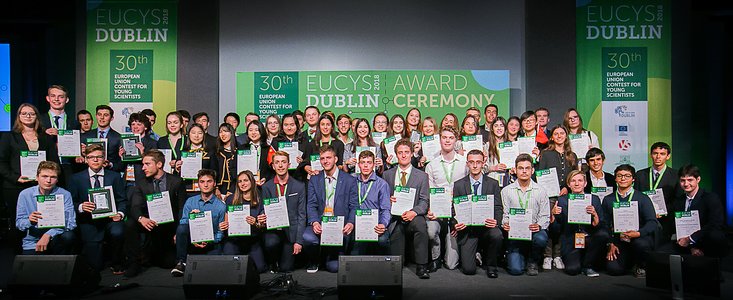Anuncio
Se dan a conocer los ganadores del concurso de la Unión Europea para jóvenes científicos 2018
27 de Septiembre de 2018
Se han anunciado los ganadores del prestigioso concurso de la Unión Europea para jóvenes científicos (EUCYS, por sus siglas en inglés). Desde 1989, el EUCYS tiene como objetivo promover la cooperación e intercambio entre jóvenes científicos, guiándolos hacia futuras carreras en el área de las ciencias y la tecnología. Este año, 135 jóvenes científicos provenientes de 38 países y las escuelas europeas se reunieron en Dublín, Irlanda, para participar en el concurso. El concurso lo evaluó el Jurado EUCYS 2018, formado por 19 jueces expertos con una gran experiencia científica.
Los tres primeros premios de la competencia EUCYS 2018 los presentó Mary Mitchell O'Connor, Ministra de Educación Superior de Irlanda, y Wolfgang Burtscher, Director General Adjunto de la Comisión Europea en el área de Investigación e Innovación. Los premios, de 7.000 euros cada uno, fueron otorgados a: Adrian Fleck (20) y Anna Amelie Fleck (16) por “FleckProtec – protección corporal fabricada con almidón”; Nicolas Fedrigo (17) por el trabajo “Mejora de las fusiones vertebrales: rediseño de la lezna pedicular para prevenir rupturas vertebrales”; y Brendon Matusch (15) por el proyecto titulado “Desarrollo de un vehículo autónomo nivel 2 utilizando redes neuronales convolucionales y aprendizaje por refuerzo”.
Los segundos lugares (5.000 euros) fueron otorgados a: Alexandru Liviu Bratosin (17), Petru Molla (17) y Mihnea Vlad Bojian (18) por “DNAdrive”; Karl Hendrik Tamkivi (18) por “Posicionamiento de refugios de maternidad para murciélagos en relación al conjunto del paisaje circundante de Saaremaa occidental”; y Francisco Miguel Araújo (17) por “Teoremas de conmutatividad para grupos y semigrupos”.
Los terceros lugares (3.500 euros) se concedieron a: Marina Gudzhabidze (18), Dea Ilarionova (17) y Shorena Gudzhabidze (17) por el proyecto titulado “Detector portátil con pantallas mosaico retro-reflectivas para visualizar inhomogeneidades ópticas”; Kyuhee Jo (18) y Chaeyoung Lee (18) por “Construcción de un modelo de clasificación sólido para el diagnóstico de la enfermedad de Parkinson basado en el habla”; y a Sijia Zhang (18) por su proyecto titulado “Investigación del problema del conflicto verbal en familias de estudiantes de secundaria”.
Como miembro del EIROforum, el grupo de las ocho principales Organizaciones Intergubernamentales Europeas de Investigación, ESO donó un premio especial para el mejor proyecto en el campo de la astronomía y la física espacial, el cual fue presentado por el asesor principal de EUROfusion, Duarte Borba. El joven de 19 años Sébastien Christophe Garmier de Suiza fue el ganador por su proyecto “cuRRay: rastreador de rayos CUDA para rayos de luz en el espacio tiempo relativista de Kerr-Newman”. Él recibirá un viaje a los sitios de ESO en Chile, incluyendo visitas al Observatorio Paranal y a las instalaciones de ESO en Santiago. El viaje le brindará una visión única de la vida en los observatorios astronómicos más avanzados del mundo.
Enlaces
Contactos
Calum Turner
Encargado de Prensa de ESO
Garching bei München, Alemania
Tel: +49 89 3200 6655
Email: pio@eso.org
Mariya Lyubenova
Outreach Astronomer
Garching bei München, Alemania
Tel: +49 89 3200 6188
Email: mlyubeno@eso.org
Uso de imágenes, videos y música de ESO
Sobre el anuncio
| Identificador: | ann18067 |


